| 
Quality
of Federal Governance improves but barely crosses 50% mark in 2015-2016; above-average
performance in 19 of 25 areas of assessment in PILDAT�s Scorecard; Transparency
at dismal 21%;
PILDAT releases 2015-16 Federal Governance Scorecard
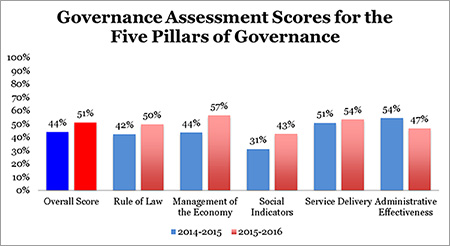
-
Federal Quality of Governance barely
crossed 50% mark as it earned an overall score of 51% in 2015-2016 improving
by 7 percentage points from the score of 44% in 2014-2015
-
Performance in 6 parameters registered
below average performance
-
The Governance Score Card is based
on the change (in the quality of governance between the second (2014-2015)
and the third (2015-2016) years of the Federal Government in office
-
Highest score of 87% was earned
by Management of Inflation; followed by Peace, Stability and Order at 73%
and third to Healthcare at 68%
-
Federal Governance in Transparency
received the lowest score at 21% consistent with the assessment for 2014-2015
as the lowest performing parameter
February 21: Quality of Federal Governance scored
51% in 2015-2016 with Management of Inflation getting
the highest score of 87% and Transparency
receiving the lowest score of 21%.
Federal Governance Score in 2015-2016 has improved
by 7 percentage points from the score of 44% in 2014-2015 Federal Governance
assessment.
PILDAT Score Card Quality on Quality of Federal
Governance in the third year highlights major governance developments during
2015-2016 through a comparative analysis of the performance against various
parameters and sub-parameters between 2014-2015 and 2015-2016 to identify low
and high performing indicators.
Improvements have been recorded in all five
pillars of governance: Rule of Law, Management of the Economy, Social Indicators,
Service Delivery and Administrative Effectiveness. Of the 25 sub-divisions of
pillars of governance, above average performance was recorded in 19 parameters,
while below average performance was recorded in 6 parameters.
The most improvement observed in Federal Governance
was in the Management of Inflation with a score of 88%.
Improvements in the management of monetary policy and the global fall in oil
prices resulted in a low average rate of inflation of 2.8% in 2015-2016. The
second highest score was observed in Peace, Stability and Order (73%)
owing to the increase in the number of insurgents/terrorists neutralized and
third highest to Healthcare (68%) due to decreasing Infant
and Maternal Mortality rates.
As the sub parameter that demonstrated the highest
improvement in PILDATs assessment compared to the previous year’s Scorecard,
Investment Friendliness earned a score of 67% in 2015-2016
compared to the score of 27% in 2014-2015. This was due to an increase in the
total amount of Foreign Direct Investment in Pakistan rising by 38% from US
$ 922.9 million in 2014-2015 to US $ 1,281 million in 2015-2016.
Transparency has consistently
been recorded as the poorest performing aspect of Federal Governance. A score
of 21% was assigned to Transparency due to the continued absence of a progressive
Right to Information Legislation at the centre. PILDATs
analysis for 2014-2015 also assigned the lowest score to Transparency.
The objective behind PILDAT's initiative on
assessment of the Quality of Governance is to highlight key areas of strengths
and potential areas requiring improvement in the quality of governance.
The initiative is intended as a collaborative effort to enable the government
and the public in making informed, fact-based assessment regarding governance
at the centre. PILDAT annually compiles the report after a year-long collection
and analysis of data gathered from various ministries, divisions, international
agencies and media.
The complete report can be accessed at:
http://www.pildat.org/Publications/publication/GovernanceAssessment/
ScoreCardonQualityofGovernanceThirdYearoftheFederalGovernment
_2015-2016.pdf
Methodology
PILDAT has assessed the overall performance of the Federal Government across
25 parameters by calculating percentage change for over 100 governance indicators
from 2014-2015 to 2015-2016. Scores were assigned on a scale of 1-5 depending
on the magnitude of the percentage increase or decrease. The Scores were calculated
by aggregating policy (25% weightage) and implementation scores (75% weightage).
The data for the Federal Score Card was requested by PILDAT and provided by
the Federal Government. It was supplemented with published surveys (i.e. Labor
Force Survey, Pakistan Economic Survey, PSLM etc.).
Scores assigned in PILDATs Scorecard
Assessment of Quality of Governance: Third Year of Governance by the Federal
Government: 2015- 2016 and 2014-2015
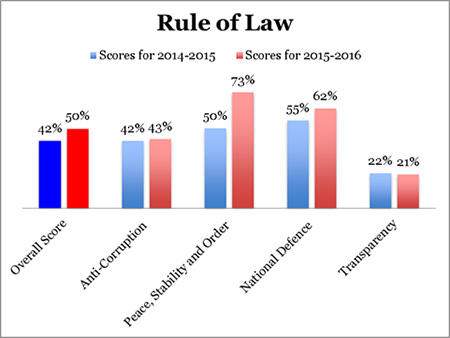
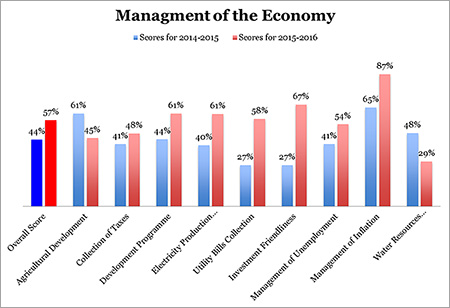
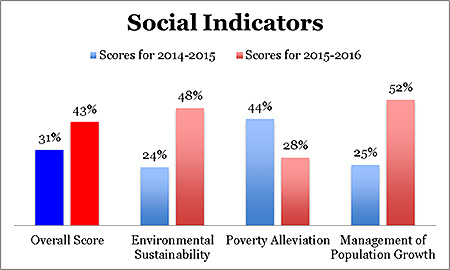
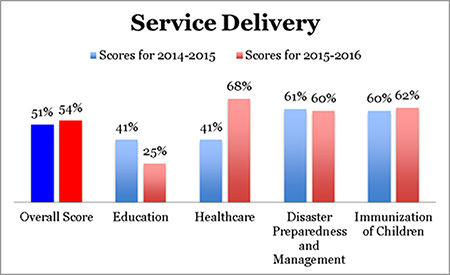
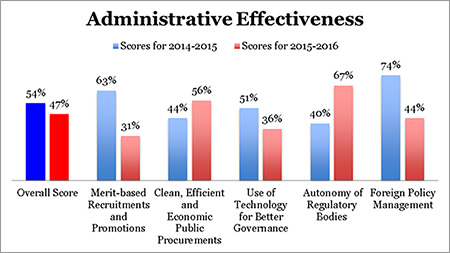
|